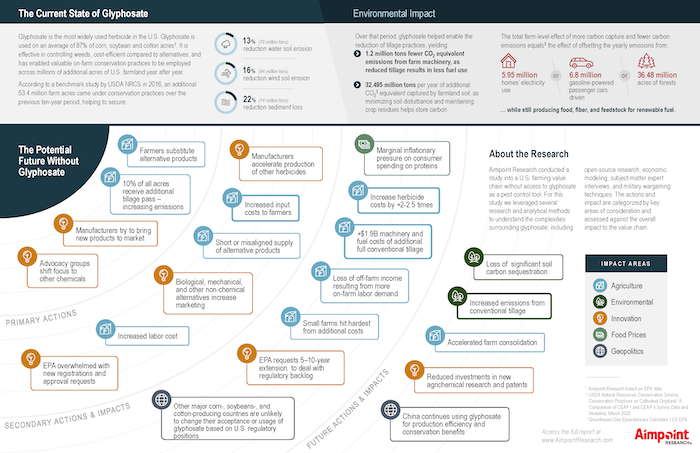Aimpoint Research today released a new report on the importance of glyphosate, a critical tool in the modern agriculture system.
ASA and other industry partners have continued to emphasize that the herbicide is critical to keeping U.S. soybean farmers productive, sustainable and competitive. When used according to label directions, glyphosate does not present an unreasonable risk of adverse effects to humans, wildlife, or the environment.
Despite years of research finding that glyphosate is safe, ongoing public debate has led to questions about what the impacts would be if it were no longer available. Leveraging multiple research and analytical methods, this report looks at what would happen to U.S. agriculture, farmers' livelihoods, the economy and the environment if this tool was suddenly no longer available for use in the U.S. It concludes that glyphosate is an indispensable tool in the crop protection toolbox.
Key Report Findings
- While markets would adapt to a world without glyphosate, it would be a substantial economic cost to farmers and cause the rapid release of greenhouse gases, reversing decades of conservation and sustainability gains.
- U.S. farmers would bear the burden of up to 2-2.5 times increased input and operating costs with small farmers disproportionately affected.
- Increased production costs would cause inflationary pressure on food prices over the long term.
- Since 2016, glyphosate use has helped achieve:
- 13% reduction in water soil erosion
- 16% reduction in wind soil erosion
- 22% reduction in sediment loss
- 1.2 million fewer tons of CO2 emissions
- 32.495 million tons per year of additional CO2 captured by farmland soil
- 5.95 million homes' electricity use
- 6.8 million gasoline-powered passenger cars driven
- 36.48 million acres of forests







Post a comment
Report Abusive Comment